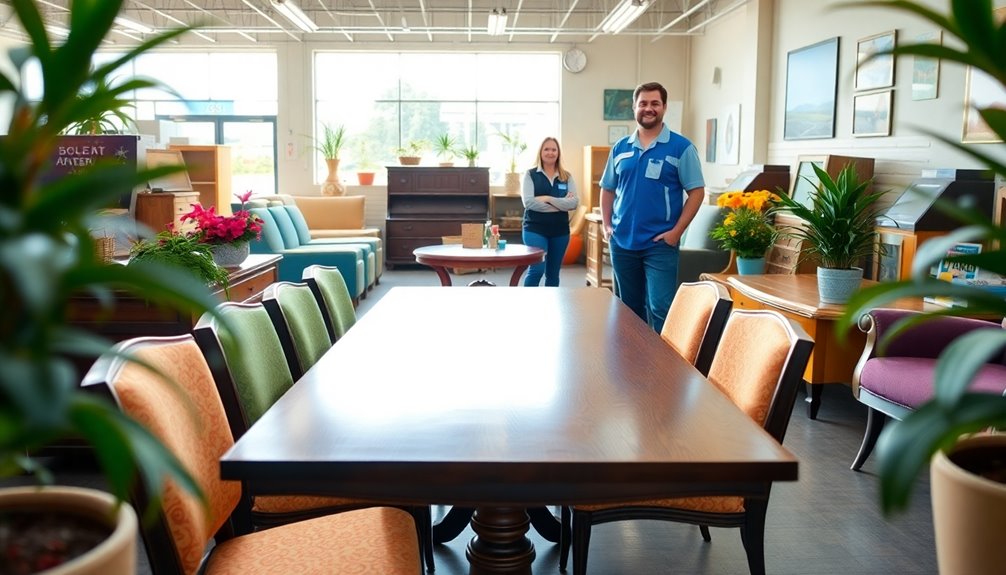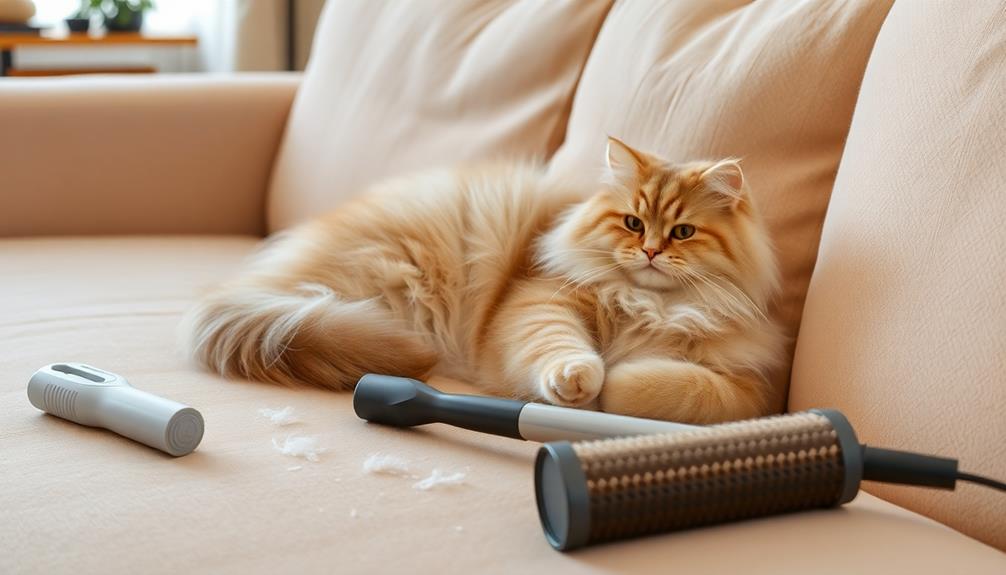Donating furniture to Goodwill is easy and rewarding. First, check if your items are acceptable, such as sofas, chairs, and dressers, ensuring they're clean and in good condition. Avoid donating large appliances, hazardous materials, or damaged furniture. Once you've selected your items, drop them off at the nearest Goodwill location or schedule a pickup if available. Don't forget to ask for a donation receipt for tax deductions! Each Goodwill has different rules, so confirming specific acceptance criteria is wise. If you'd like tips on maximizing your donation experience, keep going to learn more!
Key Takeaways
- Ensure your furniture is in good condition, clean, and free of major defects before donation.
- Confirm acceptance criteria with your local Goodwill location, as guidelines may vary.
- Organize and clean items thoroughly, separating them into containers for easy categorization.
- Visit your nearest Goodwill donation center or schedule a pickup for larger items.
- Obtain a donation tax receipt for potential tax deductions based on the item's fair market value.
Eligible Furniture Items
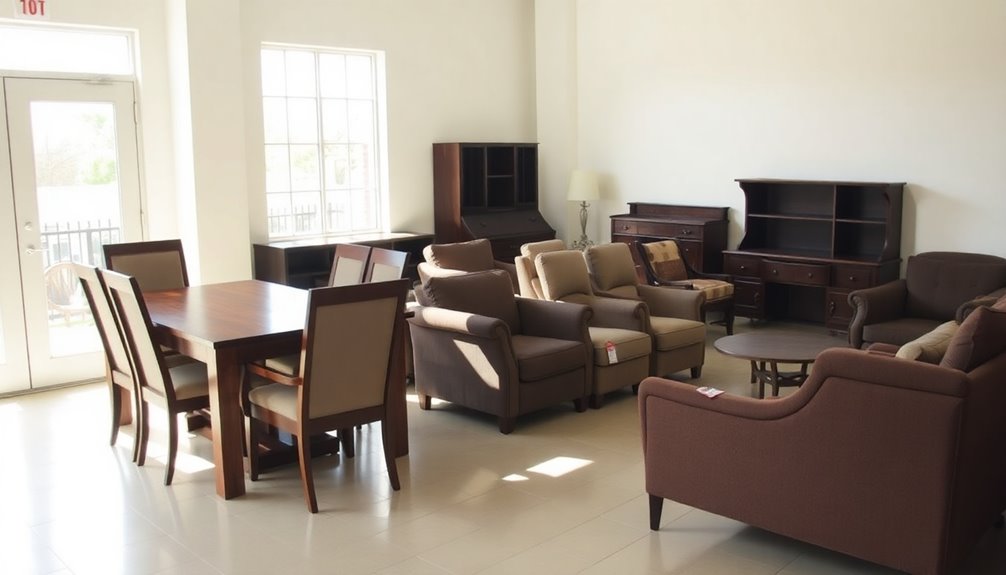
When considering donating furniture to Goodwill, it's essential to know which items are eligible. You can donate a variety of furniture pieces, including sofas, chairs, kitchen sets, end tables, and coffee tables. Upholstered furniture is generally accepted, except at certain locations like Stamford Broad St. Wooden furniture and bed frames, including headboards and rails, are also welcome.
Make sure the furniture you're donating is in good condition and clean. Goodwill won't accept items that need repair or reupholstering, so be mindful of the state of your donations. Avoid donating disassembled furniture, as it must be in working order when you drop it off. Additionally, all donations must be clean and in good condition, so ensure that your items meet this requirement.
Keep in mind that each Goodwill location has specific capacity limits, so it's wise to contact your local store to confirm what they can accept. Some locations might only take certain items, and larger pieces over 40 inches may not be accepted everywhere. If you have heavy or large items, check if your local store offers pickup services. Remember to include all parts of furniture sets and ensure everything is free from wetness, soil, or pet hair.
Items Not Accepted
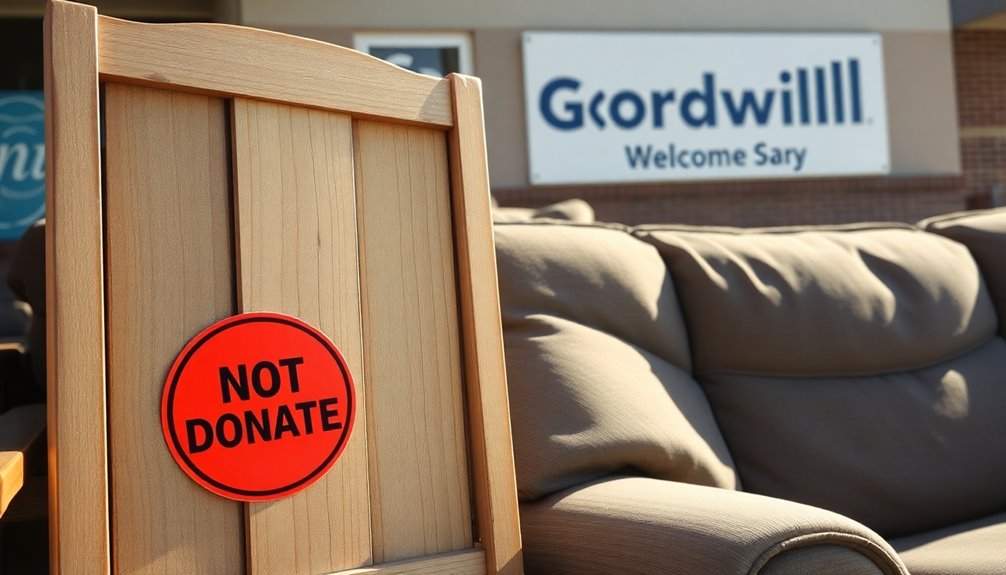
Donating furniture to Goodwill is a generous act, but it's important to know what they won't accept. First, you should avoid large household items like refrigerators, stoves, washers, dryers, and air conditioners. These appliances take up significant space and are difficult for Goodwill to manage. Additionally, large appliances pose potential injury risks during handling and transport.
When it comes to baby and infant items, steer clear of donating baby cribs, strollers, car seats, and any recalled infant equipment. Safety regulations often limit the acceptance of these items.
You also can't donate hazardous and chemical items. Paint, flammable liquids or gases, kerosene heaters, and toxic materials like pesticides and herbicides are all off-limits. These items pose safety risks and can't be disposed of through regular donation.
Finally, some miscellaneous items are restricted as well. This includes mattresses and box springs, lawn equipment like gas-powered mowers, weapons, and large exercise equipment such as treadmills or elliptical machines. Building materials like carpet and flooring are also not accepted. By keeping these restrictions in mind, you can ensure your donation process goes smoothly.
Donation Condition
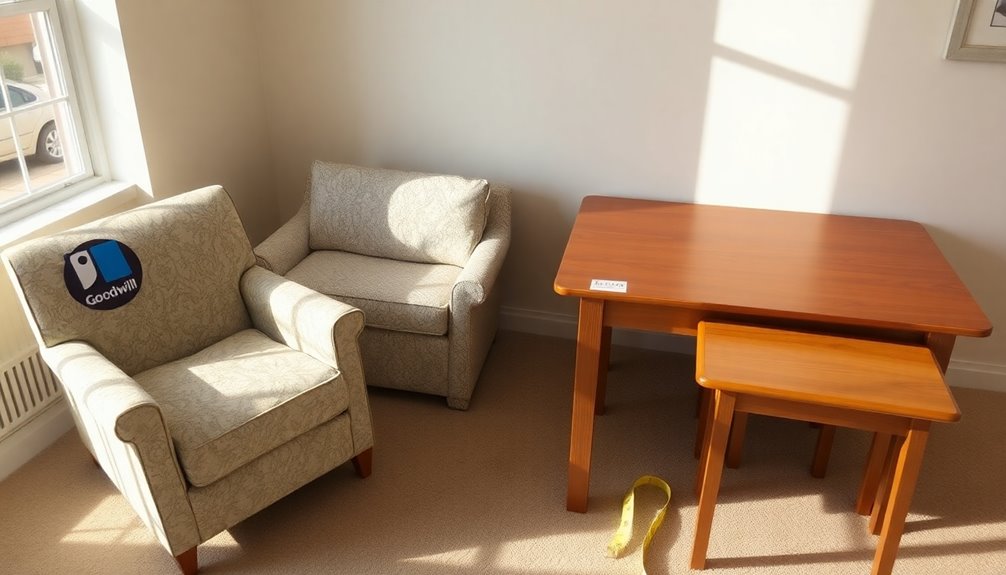
Ensuring your furniture meets Goodwill's condition requirements is key to a successful donation. First, your items should be in good, resaleable condition. Clean them thoroughly, making sure they're free of dirt, dust, and stains. Safety is crucial—avoid donating furniture with hazardous materials or defects. Check that all parts and pieces are included, and while minor flaws are acceptable, major damages aren't. Donations must be clean, safe, and resaleable to be accepted at Goodwill.
Functionality is another factor to consider. Make sure all furniture is in working condition; broken items will be turned away. For recliners, ensure they recline properly, and test any electrical components to confirm they work. If there are mechanical parts, they should be intact and operational.
When it comes to appearance, aim for items that look good with only minor imperfections. Stains, tears, or excessive wear are not acceptable. Also, ensure your furniture is free of odors and pest infestations. The overall appearance should be decent and presentable to attract potential buyers. Prepare your donations well to help others find your items ready for immediate use.
Donation Process
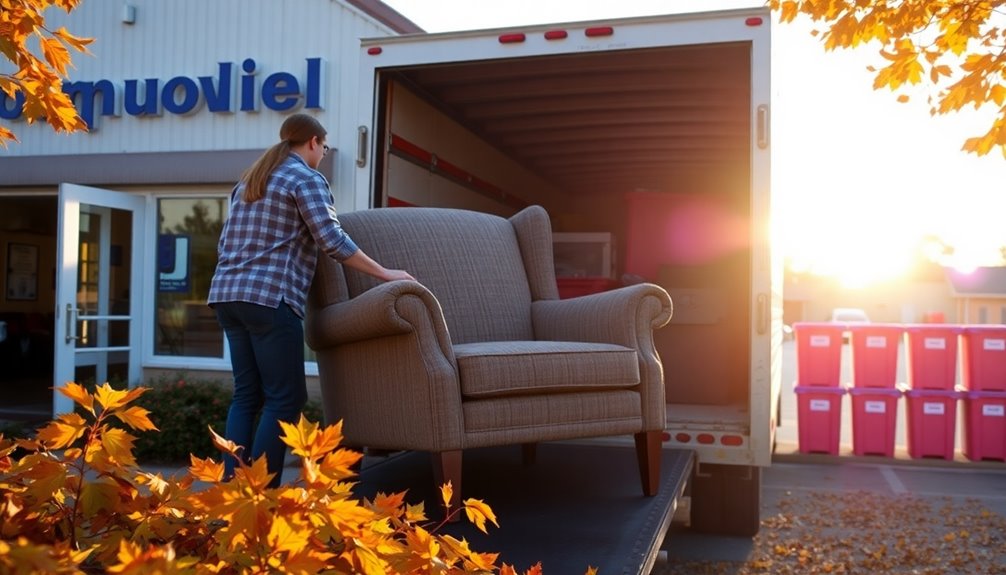
To navigate the donation process smoothly, start by getting your items ready and organized. Separate your furniture and other items into different containers, boxes, or bags to make categorization easy. Ensure that all pieces, like game parts or electronics, are included, and remove any hangers from clothing to simplify things. Clean your items, as Goodwill doesn't wash or clean them before donation. Don't forget to check for personal information in any documents.
Once your items are prepared, load them into your vehicle and head to the nearest Goodwill donation center. An attendant will be there to help you unload your donations and provide a donation tax receipt. If you're unsure where to go, use the store locator on the local Goodwill website. Some locations may also have drop-off boxes for smaller items. Additionally, remember that pickup services are available for larger items, making it easier to donate without transportation concerns.
If transporting your items isn't feasible, consider contacting your local Goodwill center to see if they offer pickup services. These services can retrieve large items from your home, often within 48 hours. Regardless of the method, you'll receive a donation receipt that you'll need for tax purposes, supporting Goodwill's mission in the process.
Location-Specific Guidelines
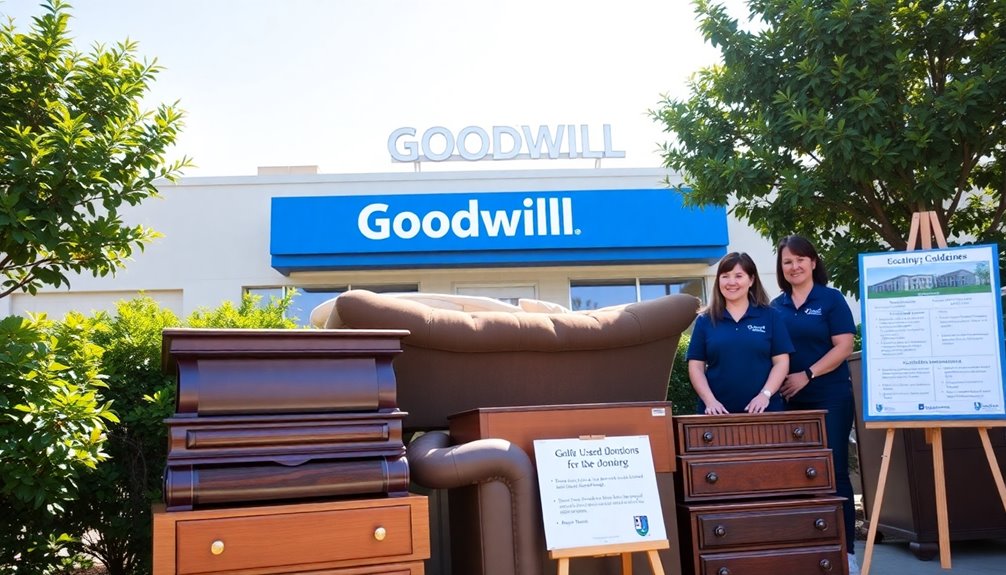
When preparing to donate furniture, it helps to be aware of the guidelines that vary by location. Each Goodwill location has its own acceptance criteria, so it's crucial to check the specifics for your area. For example, Goodwill Keystone Area accepts furniture in any condition, alongside household goods and electronics. They offer a pickup service through ReSupply, which typically occurs within 48 hours, but keep in mind that a fee applies. Additionally, this service is designed to simplify the donation process for local donors.
In contrast, Goodwill of Middle Tennessee has stricter rules; not all furniture types are accepted, and items must be in good, clean condition. You'll need to contact your local center to confirm what they'll take. Similarly, Goodwill of the Finger Lakes only accepts furniture over 25 pounds at retail stores, with no donations allowed at donation centers.
Regardless of location, it's important to remember that certain items, like hazardous materials and large appliances, are generally excluded. Always reach out to your local Goodwill for the most accurate information before you donate, as acceptance criteria can differ widely based on community needs.
Additional Considerations
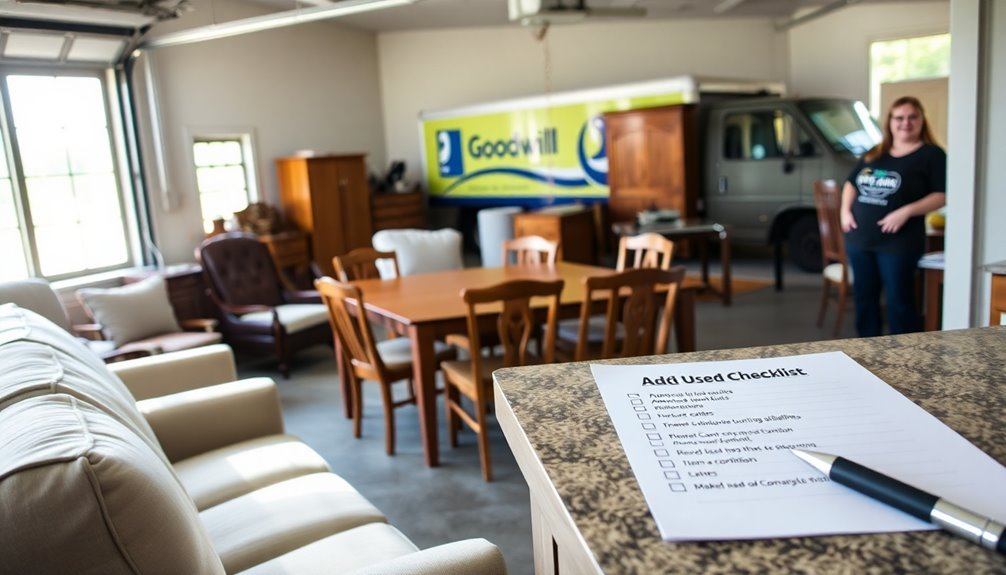
Before you donate your furniture, keep a few key considerations in mind. First, ensure that the items you plan to donate are acceptable. Goodwill typically accepts sofas, chairs, kitchen sets, end tables, and bed sets, but not large furniture over 40 inches, mattresses, or items in need of repair. Always check the specific acceptance criteria at your local donation center since some locations may have unique guidelines.
Next, focus on the condition and cleanliness of your furniture. It should be in clean, sellable condition, free from damage, stains, pests, and odors. Make sure items are fully assembled, as Goodwill doesn't accept partially disassembled pieces. Additionally, remember that items must be in clean and sellable condition to be accepted, as store managers have discretion to decline donations based on their assessment.
If you have large or bulky items, be aware that you might need to arrange for a pickup service, which could come with a fee. Lastly, remember that donations are subject to the discretion of store managers, so it's wise to contact your local center beforehand to confirm that your items can be accepted. By taking these considerations into account, you can ensure a smoother donation process.
Tax Deductible Donations

Donating furniture to Goodwill not only helps those in need but can also provide you with potential tax benefits. When you donate, you can claim a deduction on your tax return for the fair market value of your items. To determine this value, consider the item's original price, its current condition, and use Goodwill's "Value Guide" for average prices. As a rule of thumb, you might estimate about 30% of the original price for items not listed in a value guide. Additionally, keep in mind that the condition of the item plays a crucial role in determining its fair market value.
Make sure your furniture is in gently-used, non-broken condition, free of stains and holes. Acceptable items include sofas, dressers, and lamps, among others. After donating, always request a receipt from Goodwill. If your donation is valued at $250 or more, a written acknowledgment is necessary for tax purposes.
Confirming Pickup Services

After securing potential tax benefits from your furniture donations, the next step is confirming pickup services. Goodwill offers free pickup for gently-used home furnishings, making it convenient for you to donate. You can schedule pickups for various occasions, such as moving, settling an estate, or downsizing for senior living. Goodwill also provides pickups after church, school, and neighborhood yard sales.
To confirm availability, contact your local Goodwill donation center. They'll provide you with details on scheduling and what items they can accept. If you have larger items, Goodwill collaborates with ReSupply, which can retrieve furniture from anywhere in your home and even dismantle it if necessary. ReSupply typically offers pickup services within 48 hours and supports veterans transitioning into civilian life.
When preparing for pickup, ensure your furniture meets the accepted criteria—upholstered and wooden pieces, kitchen sets, and office furniture are welcome, while items needing repair or large appliances are not accepted. By confirming these services, you can ensure a smooth donation process that benefits both you and those in need.
Frequently Asked Questions
Can I Donate Furniture From a Business or Office?
Yes, you can donate furniture from a business or office! Just make sure it's in good condition, clean, and safe for resale. Most Goodwill locations accept office furniture like desks, chairs, and shelving. You can drop off items at a nearby store or check if they offer pick-up services for larger items. Don't forget to request a receipt for tax deduction purposes. Your donation supports job training and community programs!
What Are the Benefits of Donating Furniture to Goodwill?
Donating furniture to Goodwill offers numerous benefits. You're helping your community by providing affordable goods and supporting job training programs. Plus, you're contributing to environmental sustainability by keeping items out of landfills and promoting reuse. Don't forget the potential tax deductions you can receive, which can ease your financial burden come tax season. Overall, your generosity not only aids others but also fosters a healthier, more sustainable environment.
How Does Goodwill Determine the Value of Donated Furniture?
Goodwill determines the value of donated furniture based on fair market value, which reflects what a willing buyer would pay. They assess the item's condition, ensuring it's gently-used and free of stains or damage. For valuation, you can refer to their Donation Value Guide, which lists average prices for various items. If your item isn't listed, you can estimate its value as 30% of the original price. Keeping records will support your tax deductions.
Can I Volunteer to Help With Furniture Donations?
Yes, you can definitely volunteer to help with furniture donations! Reach out to your local Goodwill store to ask about volunteer opportunities. You'll assist donors in unloading and preparing their furniture, provide information on accepted items, and help inspect furniture for quality. Volunteering not only supports the donation process but also contributes to Goodwill's mission of job training and employment. Check their website for more details on how to get involved.
What Happens to My Donated Furniture After It's Accepted?
When you donate furniture and it’s accepted, it undergoes inspection to ensure it’s in good condition. If it meets quality standards, it gets sorted into categories for efficient sale in stores. Your items are then displayed and sold, with proceeds supporting community programs like job training and education. By donating, you’re helping families in need and promoting sustainability, as your furniture is reused instead of ending up in landfills. Additionally, if you’re looking to maximize the impact of your furniture donation, consider researching local charities or organizations that can directly benefit from your items. You may also want to share some tips for selling used furniture with others in your community, as this can help improve their chances of finding a new home for their items. By spreading awareness and offering advice, you contribute to a culture of reuse and support for those in need.
Conclusion
Donating furniture to Goodwill is a simple way to give back while decluttering your space. By ensuring your items are eligible, in good condition, and understanding the donation process, you can make a positive impact. Remember to check for location-specific guidelines and keep tax deductions in mind. Whether you drop off or schedule a pickup, your generosity can help those in need. So, gather your items and make a difference today!
